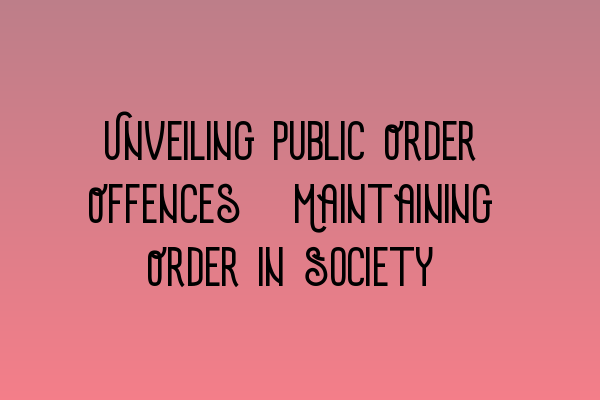Unveiling Public Order Offences: Maintaining Order in Society
Public order offences play a crucial role in maintaining peace and harmony in society. These offences are designed to protect individuals and communities from behavior that can disrupt social order and stability. In this article, we will delve into the world of public order offences, exploring their definition, types, and the legal consequences they entail.
Defining Public Order Offences
Public order offences encompass a wide range of behaviors that can disturb the peace and tranquility of a community. These offences can be committed in public places, or even through the use of electronic communication. They include but are not limited to:
- Disorderly conduct
- Disturbance of religious or sporting events
- Incitement to racial or religious hatred
- Public drunkenness
- Violent behavior
- Intentional harassment, alarm, or distress
Public order offences are typically covered under legislation such as the Public Order Act 1986 and the Communications Act 2003. These laws provide a framework for the prosecution and punishment of individuals who violate public order.
Types of Public Order Offences
There are several types of public order offences that individuals can be charged with. It is essential to understand these to grasp the gravity of the actions and their legal implications:
- Disorderly Conduct: Disorderly conduct refers to behavior that is likely to cause harassment, alarm, or distress to others. This can include engaging in fights, using offensive language, or acting in a disorderly manner in a public place.
- Disturbance of Religious or Sporting Events: It is a criminal offense to disrupt religious or sporting events intentionally. Such behavior can create tension among groups and potentially lead to violence.
- Incitement to Racial or Religious Hatred: Inciting racial or religious hatred is a grave offense that can result in significant harm to communities. It involves intentionally stirring up hatred against a particular racial or religious group.
- Public Drunkenness: Being publicly drunk in a way that causes harassment, alarm, or distress is an offense. Excessive alcohol consumption can impair judgment and lead to disorderly behavior.
- Violent Behavior: Any act of violence, whether physical or verbal, can be considered a public order offense. This includes threats, assaults, and acts of aggression.
- Intentional Harassment, Alarm, or Distress: Behavior that intentionally causes harassment, alarm, or distress to others constitutes a public order offense. This can include stalking, verbal abuse, or persistent unwelcome actions.
Legal Consequences
The consequences of committing a public order offense can vary depending on the severity and circumstances of the situation. Convictions for public order offenses can result in:
- Imprisonment
- Fines
- Community service
- Probation
- Restraining orders
It is vital to seek legal representation if you are charged with a public order offense. A qualified solicitor can provide the guidance and support needed to navigate the legal process and present a robust defense.
Conclusion
Public order offenses are a critical aspect of maintaining order and stability in society. By defining and punishing behaviors that can disturb peace, these offenses serve to protect individuals and communities. It is essential to stay informed about the criminal laws in the UK and understand the consequences of violating public order. If you require further insights into criminal practice, consider attending our Workshops and Seminars on Criminal Practice: Expanding Your Expertise or explore our other resources like Updates in UK Criminal Laws: Staying Informed and Prepared. Enhance your SQE criminal law study group experience with our SQE Criminal Law Study Group Experience and gain a deeper understanding of topics like Decoding Criminal Evidence Rules: A Detailed Analysis. For a closer look at state prosecution, explore our article on Public Prosecutions in the UK: A Closer Look at State Prosecution.
